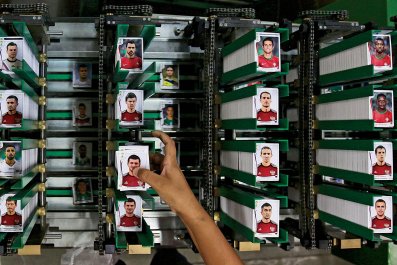When Elad Leshem graduated with an MBA two years ago, he immediately started a company. So far, so conventional. But Leshem, a now-33-year-old Israeli, launched his entrepreneurial career in Berlin.
"In Berlin there are a lot of resources available, including grants, subsidies and incubators, and the city is still relatively cheap," explains Tel Aviv-born Leshem. "That allows you to kickstart your business without a lot of capital. That's not possible in Silicon Valley. And the city is groovy with a lot of young people."
Leshem is far from the only Israeli who has discovered Berlin. "When I moved here to go to university, people at home said, 'Why are you moving to Germany? I'm never going to visit you'", recalls Asaf Moses, a 31-year-old fashion technology entrepreneur from the town of Ra'anana outside Tel Aviv. "But since then the number of Israelis has increased at an incredible rate. Today you can easily build a company here with just highly qualified Israelis. Berlin has become the international symbol of cool instead of a symbol of the Holocaust."
It's no surprise that Israel, with its around 4,800 startups at any given time, sees some of its entrepreneurs try their skills elsewhere. As far as Leshem, Moses and their fellow entrepreneurs are concerned, choosing Berlin is simply a matter of business opportunities and cost of living the same way it is for budding entrepreneurs of many nationalities. Leading venture capital firms like Sequoia and Kleiner Perkins have recently invested in Berlin startups, and Soundcloud, the popular music-sharing service founded by two Swedes, is also based here.
Though there are no reports quantifying the number of Israeli-run startups, incubators and business, schools all report a growing presence in the German capital. Israeli commercial attaché Hemdat Sagi alone receives around 150 direct inquiries from Israeli entrepreneurs and companies each year. "Israeli companies understand the potential of operating in a market of 82 million consumers and it's only natural for them to try and penetrate this market, which is also not so far from Israel", he explains. "Israeli companies, not just startups, offer innovative solutions in various sectors, which are synergetic with the abilities of the German industry."
Among the Berlin-based creations are: InFarm, which allows people to grow micro vegetables indoors; Capsuling Me, which measures and monetises fan engagement; and Screemo, which sets up interaction platforms between audience mobiles and large screens.
Berlin incubators and accelerators including media conglomerate Axel Springer's Plug and Play now feature Israeli startups. "The [entrepreneurs] basically just have to step off the plane and everything is set up for them," promises Axel Menneking, international director at Deutsche Telekom's incubator, hub:raum, which already has five Israeli firms on its ledgers and is aiming for more. "Large German companies have started approaching budding Israeli entrepreneurs as well," he adds. "It's in their interest to support this trend."
Berlin's grants and subsidies to entrepreneurs form part of a deliberate strategy to position the city as an attractive business alternative to other European capitals and indeed to -Germany's own business capital, Frankfurt. The effort makes sense for this relatively poor metropolis with a GDP per capita of €29,300 compared to London's €48,500, as startups require relatively little investment and the city already boasts a young workforce. Israel, for its part, keeps producing talented would-be entrepreneurs.
"The Israelis learn very useful skills during their conscription in the armed forces, particularly those who serve in intelligence units, where they're constantly exposed to problems that they know nothing about, and yet they have to come up with solutions", observes Menneking. "That's exactly what you have to do in a startup."
The German-Israeli Chamber of Commerce has spotted the trend as well, recently launching an initiative called Betatec (Berlin Tel Aviv Technology and Entrepreneurship Committee). The programme will help Israelis start companies in Berlin but also send German entrepreneurs to Israeli incubators, where they'll receive mentoring. "The idea is that this will help the German economy, but indirectly it will help the Israeli economy as well", explains Mickey Steiner, Betatec's director and the former Israel CEO of German software giant SAP. To further increase Berlin's attractiveness, Betatec will also offer localisation services to Israeli firms to help them expand more easily in Germany and beyond.
Still, Berlin isn't an entirely obvious alternative to Silicon Valley or even London. "If an Israeli does business with a Brit or American, of course it's good, but it's just business", observes Yakov Hadas-Handelsman, Israel's ambassador to Berlin. "This is much more. The destinies of Israelis and Germans are connected because of our past. That makes the startup trend important in itself, and it goes both ways, with Germans going to Israel." But, he hopes, it will help increase trade between the two countries, one of which is the world's fifth largest economy. Hadas-Handelsman recognises the unconventional nature of the trend, noting that "some people in Israel don't view it favourably". But, he adds: "We have nothing against it; on the contrary. It's a win-win for Germany and Israel."
Entrepreneurs are not the only Israelis -moving to Berlin, either: plenty of artists and scientists are putting down roots in the city as well. The city now features several Israeli restaurants, even a German-language Israeli online magazine. And Daniel Barenboim, the celebrated pianist and conductor who was born in Argentina but also holds Israeli citizenship, is music director of the Staatsoper, Berlin's -leading opera house. According to one popular estimate, 40,000 Israelis live in the German capital, though in truth nobody knows. Yet the combination of Israeli entrepreneurship and Germany's market and infrastructure holds particular promise. Hadas-Handelsman, noting that it takes less time to fly from Berlin to Tel Aviv than from New York to San Francisco, predicts an ever-growing business exchange between the two cities.
According to Steiner, Israelis' risk-taking nature contributes hugely to their startup success, and such risk-taking famously works wonders in Silicon Valley as well. That very quality gives Israelis a competitive advantage in Berlin, argues Leshem, who recently founded a second company following the demise of his first one. "Israelis are pushy and loud while Germans are more conformist and quiet," he elaborates. "Israelis have a 'let's do it' attitude and less fear of failure, like you see in the US. When an Israeli innovates, his attitude is 'let's build a fucking great company that we can sell for €1 billion'. Germans are more thorough and stable. But in a startup it's more about fast and dirty than slow and clean."
There's just one thing Leshem doesn't like about doing business in Berlin: the need to speak German. "It's really easy to start a company here, and it just costs you €200-300, but to get all those wonderful subsidies, you have to fill out a lot of forms in German," he laments. "German authorities don't care whether you're Bill Gates. They want you to fill out the forms in German."
Other entrepreneurs point out that the city's incubators aren't (yet) at the same level as, for example, San Francisco-based Y Combinator, which spawned AirBnb.
Moses, who does speak German, calls German skills a prerequisite for startup success in Berlin. He knows what he's talking about, having grown his fashion technology company, -FitAnalytics, which he co-founded with a German friend four years ago, to 15 employees working in the trendy neighbourhood of Kreuzberg. -
But Israeli engineers with no immediate plans to start their own companies need not bother learning the language, he advises: "There's such a shortage of engineers here that you'll get a job the day after you land." According to a recent survey by the Institut der deutschen Wirtschaft, 31-60% of German companies have trouble finding qualified workers, and 51% of the shortage professions are engineering-related.
That shortage, of course, affects startups as well. So does the city's rising costs, especially its rents, which rose by 2.6% last year. Still, the average rent per square meter is less than €6, a bargain compared to the current €44-88 per square meter range in central London. And for all its groovy-ness, Berlin will never be just another London or Silicon Valley.
So it is that next year, which marks the 50th anniversary of German-Israeli diplomatic relations and will be celebrated in appropriately ceremonial ways, may generate even more interest in the bilateral startup exchange. "If we can get 15-20 German startups to Israel next year, and the same number of Israeli startups to open in Berlin, we'll consider it a success", says Steiner.
Despite the language barriers, Leshem, who holds German citizenship thanks to his- -German-born maternal grandparents, has no plans to leave the bustling capital. In fact, even though he moved there purely for business reasons, the fast-talking entrepreneur feels he's taking revenge on the man responsible for the death of several relatives on his mother's side. "Today's multicultural Berlin is history's joke on Hitler", he says. "Berlin of 2014 is the happy opposite of the dark Berlin of 1934."
History has, in fact, come full circle: Leshem's mother is in the process of buying an apartment in Berlin. She'll join her son and his fellow Israelis – and thousands of Jews from Central and Eastern Europe – in a city that once had 170,000-strong Jewish community.






























